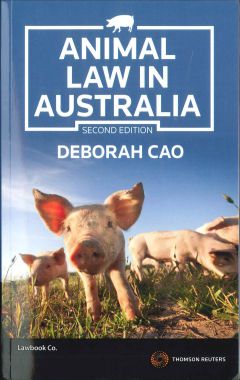Results
| Title | Citation | Alternate Citation | Summary | Type | ||||||
|---|---|---|---|---|---|---|---|---|---|---|
| Derecho Animal Volume 10 Núm 4 |
|
Policy | ||||||||
| James S. Cable, Plaintiff v. Burrows, Defendant |
This California judgment awarded no money to plaintiff on his claims. |
Pleading | ||||||||
| Animal Law in Australia |
|
Policy | ||||||||
| UT - Domestic Violence - Cohabitant Abuse Procedures Act. 77-36-1. Definitions | U.C.A. 1953 § 77-36-1 | In 2022, Utah amended its statute defining "domestic violence" to include aggravated cruelty to an animal, as described in Subsection 76-9-301(4), with the intent to harass or threaten the other cohabitant. | Statute | |||||||
| NY - Police Dog - § 122-c. Transport of police work dogs injured in the line of duty | NY GEN MUN § 122-c | McKinney's General Municipal Law § 122-c | This New York statutes allows for paramedics or emergency medical service technicians to transport any police work dog that is injured in the line of duty to a veterinary clinic if there are no persons requiring medical attention or transport at such time. | Statute | ||||||
| CA - San Mateo - Title 6 - ANIMALS | Title 6 - ANIMALS, Sections 6.04.010 to 6.20.160 |
These are the ordinances in San Mateo, California that deal with animals. The laws regulate animal control, exotic animals, spaying, neutering, and breeding, kennels, catteries, and animal fanciers permits.
|
Local Ordinance | |||||||
| U.S. v. Clucas | 50 F.Supp. 609 (D.C. Va. 1943) |
Defendant and several individuals went on a duck hunt in and were charged with exceeding the limit for migratory birds under Virginia law. The game wardens testified that the defendant, Clucas, admitted in the presence of the other parties that they had killed more than the 'bag', meaning thereby that they had killed more than ten ducks allowed for each person. The government held the position that the other individuals were hired for the reason of taking or killing the ducks. The court held that in view of the fact that January 6, 1943, was not the first day of the season the possession of twenty-six ducks by the two defendants did not constitute a violation of the provisions of the Virginia regulation. The possession being legal, the burden of proof did not shift to the defendants. |
Case | |||||||
| IA - Veterinary Liens - Chapter 581. Veterinarian's Lien | I. C. A. § 581.1 - 4 | IA ST § 581.1 - 4 | This section of Iowa laws relates to veterinary liens related to treatment of livestock. A veterinarian shall have an agricultural lien as provided in section 554.9102 for the actual and reasonable value of treating livestock, including the cost of any product used and the actual and reasonable value of any professional service rendered by the veterinarian. In order to perfect the lien, the veterinarian must file a financing statement in the office of the secretary of state as provided. “Livestock” means an animal belonging to the bovine, caprine, equine, ovine, or porcine species, ostriches, rheas, emus, poultry, or fish or shellfish. | Statute | ||||||
| U.S. v. McDougall | 25 F.Supp.2d 85 (N.D.N.Y. 1998) |
Defendants Goodfriend and Benney, commercial fishermen licensed pursuant to the New York State Department of Environmental Conservation ("DEC"), are charged with catching and failing to return substantial quantities of eel and walleye from Lake Ontario and New York waters in violation of New York law that prohibits commerce in these fish because of health and conservation concerns. Aware of the ban prohibiting the sale of eel and walleye taken from these waters, Goodfriend and Benney subsequently sold the eel and walleye to a host of fish wholesalers and retailers, located within and outside New York. Defendant truck driver's alleged filing of false Canadian customs forms relating to eel and walleye he was transporting from the U.S. to his Canadian employer were violations of the Lacey Act, regardless of whether these acts violated Canadian law. |
Case | |||||||
| In the MATTER OF the TITLE, BALLOT TITLE AND SUBMISSION CLAUSE FOR 2021-2022 #16 | 489 P.3d 1217 (Colo. 2021) | Opponents of an initiative in Colorado petitioned for a review of the Ballot Title Setting Board's decisions regarding the initiative's title, ballot title, and submission clause. The initiative proposed to amend the state's criminal animal cruelty statutes by ending certain exemptions for livestock, creating a safe harbor for their slaughter with certain conditions, and expanding the definition of "sexual act with an animal." The opponents alleged that the initiative violated the single subject requirement by covering multiple subjects. The Supreme Court reviewed the case and found that the central focus of the initiative was to extend animal cruelty statutes to cover livestock. The initiative's safe harbor provision for the slaughter of livestock did not violate the single subject rule. The initiative's expansion of the definition of "sexual act with an animal" violated the single subject rule. The Court reversed the lower court's decision. | Case |
